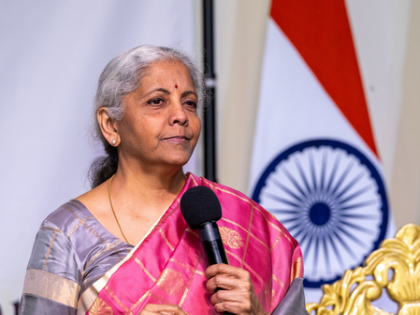FM Sitharaman to attend ADB meeting in Milan, hold bilateral meetings
By IANS | Updated: May 4, 2025 17:42 IST2025-05-04T17:38:20+5:302025-05-04T17:42:25+5:30
New Delhi, May 4 Finance Minister Nirmala Sitharaman will lead the Indian delegation of officials from the Department ...

FM Sitharaman to attend ADB meeting in Milan, hold bilateral meetings
New Delhi, May 4 Finance Minister Nirmala Sitharaman will lead the Indian delegation of officials from the Department of Economic Affairs of the Ministry to attend the 58th Annual Meeting of the Board of Governors of Asian Development Bank (ADB), scheduled to take place in Italy's Milan from May 4 to 7, according to an official statement issued on Sunday.
The meetings will be attended by official delegations of the Board of Governors of ADB, official delegations of ADB members, and international financial institutions. The Finance Minister will participate in the Annual Meeting’s focal events like the Governors’ Business session, Governor’s Plenary Session and as a panelist in the ADB Governors’ Seminar on "Cross-Border Collaboration for Future Resilience".
On the sidelines of the ADB’s 58th Annual Meeting, Sitharaman will also hold bilateral meetings with her counterparts from Italy, Japan, and Bhutan, in addition to meetings with President of ADB, the President of the International Fund for Agricultural Development (IFAD), and the Governor of the Japan Bank for International Cooperation (JBIC), the statement said.
The Union Finance Minister will also interact with the Indian diaspora in Milan, besides meeting global think-tanks, business leaders and CEOs, and participating in a Plenary Session of the NEXT Milan Forum at the Bocconi University on "Balancing Economic and Climate Resilience", the statement added.
Cross-border collaboration is seen as crucial for building future resilience by enabling countries to share resources, information, and best practices to address challenges like pandemics, disasters, and economic instability. This cooperation strengthens borderland resilience, fosters mutual learning, and promotes sustainable development.
The collaboration allows countries to learn from each other's experiences and implement effective strategies, fostering a more resilient and sustainable future.
It promotes sustainable development by sharing best practices in areas like infrastructure, resource management, and environmental protection. Establishing mechanisms for sharing information, intelligence, and best practices can improve preparedness and response to crises.
Sharing resources, infrastructure, and expertise can enhance the ability of countries to address shared challenges. Countries can also align their policies and regulations to facilitate cross-border cooperation in areas like trade, investment, and environmental protection.
Disclaimer: This post has been auto-published from an agency feed without any modifications to the text and has not been reviewed by an editor
Open in app